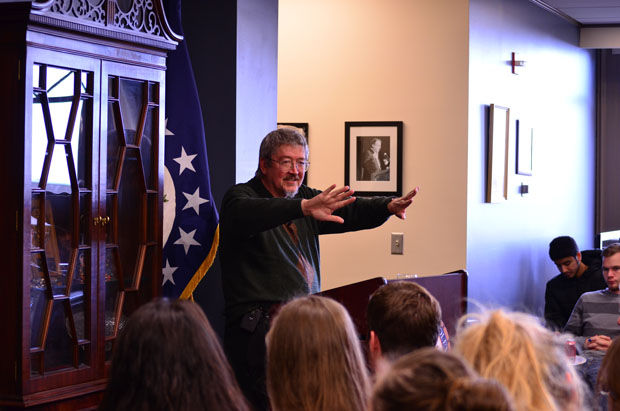A different perspective
Author Tamim Ansary explains the unique connections and close-knit networks of Afghan communities and the effects 9/11 had on perceptions of those communities, Tuesday, Nov. 18, 2014.
November 19, 2014
In modern, non-Islamic lands, young Muslim’s are struggling to define their identity, but are beginning to find their way, according to Afghan-American author Tamim Ansary.
Ansary gave two separate talks to WSU students yesterday, attempting to bring understanding to the Afghan-American story.
Ansary, who was born to an Afghan father and an American mother, has spent much of his life studying Islam and attempting to interpret the Islamic world for the West.
In his lecture, “Disentangling Post-911 Images of Islam,” Ansary described some of the history of Islam, but also how the Islamic world has grown to where it is today.
He spoke about one of his younger family members, a well-behaved Afghan son to his Afghan father who had a life very different from what he saw at home.
As Ansary got to know him and other people from his generation who moved to America when they were young or were born in the U.S., Ansary said he began to understand their story.
“This group of young Afghans had a subtly wrenching story,” Ansary said, “these kids grew up in the shadow of their parent’s holocaust.”
He said that practically everyone his age living in California at the time had some horrific story to tell of how his or her families were ripped apart by bombings.
The young Muslims who were going to high school in the U.S. at the time were often discriminated against. Other students looked down on them and were suspicious of them.
“One guy said ‘I pretend to be American in public, pretend to be Afghan at home, and I ask myself when do I stop pretending’,” Ansary said.
Before 9/11, Afghanistan was not in the consciousness of the general public. But then, Ansary said, the public began looking at Muslims and said “you’re not one of us, get out of here.”
These young adults were attempting to find a way to assert that they are good people, when society believed they were extremists or jihadists.
Ansary said that many of the movements in the Islamic had given people a sense of identity. And developing your identity and finding a purpose in life is often the driving force behind these movements, he added.
Jesse Spohnholz, director of the Roots of Contemporary Issues program, found this aspect of the lecture particularly interesting.
“Too few people have given attention to what it is like for Islamic people in non-Islamic lands,” Spohnholz said.
Later, Ansary said that Islamic culture is so many things, and taking particular acts of extremists and expanding them to the culture is unfair.
However, he also said that some young Muslims have found their way in America, and that his book “Destiny Disrupted, A History of the World Through Islamic Eyes,” gives them a way to embrace Islam with affection.
Charles Weller, instructor of world history and Asia studies at WSU, said he is impressed with how WSU has embraced the Muslim community.
“They have a good presence and a good reputation,” Weller said, “WSU has been very supportive overall.”
In the Foley Institute event earlier in the day, “Games Without Rules,” Ansary gave his own perspective on life in Afghanistan aside from military involvement.
Students and community members gathered to hear about Ansary’s view on the Afghanistan affairs.
His overall theme during the presentation touches base on the fact that Afghanistan’s system is much different than here in the U.S.
The United States, Ansary said, has a view of Afghanistan as not having a stable government. This is compared to the United States, who has an intricate system of government officials, and formal interactions.
Two words associated with Afghanistan, Ansary said, that come up most frequently in American media is the ‘Taliban’ and ‘corruption.’
Ansary describes the Taliban as a group of people, focused on ruling Afghanistan. He said that this kind of organization is usually how most things are run.
“In my experience … there is another whole network of power that exists in Afghanistan,” Ansary said.
He tells a story about a man who claimed to be his very distant cousin in which he pressed for him to visit. At the end of the visit, he is presented with a gift.
This kind of interaction is an example of how relationships are established in Afghanistan. Personal relationships and connections are highly valued, Ansary said.
According to Ansary, the U.S. is looking at Afghanistan’s system as something that needs to be fixed.
“We should step back and not look at it as ‘what we are going to do there’,” Ansary said.






















